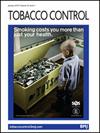Coolants, organic acids, flavourings and other additives that facilitate inhalation of tobacco and nicotine products: implications for regulation
IF 4.7
2区 医学
Q1 PUBLIC, ENVIRONMENTAL & OCCUPATIONAL HEALTH
引用次数: 0
Abstract
To inform regulatory policy, this article summarises findings on inhalation facilitation from the ninth report of the WHO Study Group on Tobacco Product Regulation. Some additives counteract the harshness and bitterness of tobacco and nicotine product aerosols, making them easier to inhale. Additives that promote inhalability may perpetuate and increase the use of inhaled tobacco and nicotine products, especially by young people. Thus, as a class, additives that facilitate inhalation are an important regulatory target to prevent tobacco and nicotine product uptake. We defined inhalation facilitation as modifications to products during manufacturing that enhance the sensory experience and (potentially) behaviours associated with inhalation (eg, deeper puffs, faster inhalation, larger puff volume, shorter intervals in between puffs and use episodes). Evidence review showed that: (a) menthol and synthetic coolants decrease irritation caused by aerosol constituents by activating sensory perception receptors (eg, cooling receptors) and may promote dependence in inexperienced users; (b) acid additives and sugars, which lower the pH of aerosols and shift nicotine from free-base to protonated salt forms, reduce harshness and increase blood nicotine yield; (c) e-cigarette flavourings perceived as sweet or fruity reduce subjective bitterness, increase attractiveness and may escalate use, although their effects on perceived harshness are inconclusive; (d) sugars in tobacco impart sweet sensations, but limited industry-independent data preclude strong conclusions for sugars’ roles in inhalation facilitation. Given these findings, WHO policy recommendations suggest that regulators might consider banning ingredients that facilitate inhalation in all commercial inhaled tobacco and nicotine products.有助于吸入烟草和尼古丁产品的冷却剂、有机酸、调味剂和其他添加剂:对监管的影响
为了给监管政策提供信息,本文总结了世卫组织烟草制品监管研究小组第九次报告中有关吸入便利性的研究结果。一些添加剂可抵消烟草和尼古丁产品气溶胶的刺激性和苦味,使其更易于吸入。促进吸入性的添加剂可能会使吸入式烟草和尼古丁产品的使用永久化和增加,尤其是年轻人。因此,作为一类添加剂,促进吸入的添加剂是防止烟草和尼古丁产品摄入的重要监管目标。我们将促进吸入定义为在生产过程中对产品进行改良,以增强与吸入相关的感官体验和(潜在的)行为(例如,吸得更深、吸得更快、吸入量更大、吸入和使用间隔时间更短)。证据审查显示(a) 薄荷醇和合成冷却剂通过激活感官感受器(如冷却感受器)减少气溶胶成分造成的刺激,并可能促进缺乏经验的使用者产生依赖性;(b) 酸添加剂和糖可降低气溶胶的 pH 值,并使尼古丁从游离碱形式转变为质子盐形式,从而减少刺激性并增加血液中尼古丁的产量;(c) 被认为是甜味或果味的电子烟调味剂可减少主观苦味,增加吸引力,并可能增加使用量,但它们对感觉到的刺激性的影响尚无定论;(d) 烟草中的糖可带来甜味,但独立于行业的数据有限,无法就糖在吸入促进中的作用得出有力结论。鉴于这些研究结果,世卫组织的政策建议表明,监管机构可考虑禁止在所有商业吸入式烟草和尼古丁产品中添加促进吸入的成分。
本文章由计算机程序翻译,如有差异,请以英文原文为准。
求助全文
约1分钟内获得全文
求助全文
来源期刊

Tobacco Control
医学-公共卫生、环境卫生与职业卫生
CiteScore
9.10
自引率
26.90%
发文量
223
审稿时长
6-12 weeks
期刊介绍:
Tobacco Control is an international peer-reviewed journal covering the nature and consequences of tobacco use worldwide; tobacco''s effects on population health, the economy, the environment, and society; efforts to prevent and control the global tobacco epidemic through population-level education and policy changes; the ethical dimensions of tobacco control policies; and the activities of the tobacco industry and its allies.
 求助内容:
求助内容: 应助结果提醒方式:
应助结果提醒方式:


